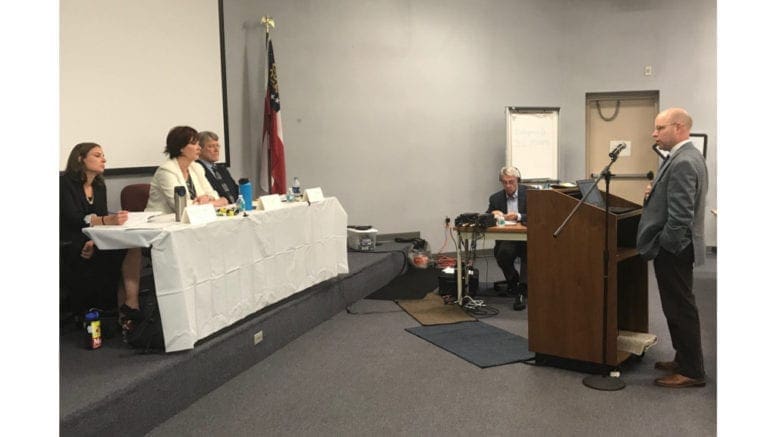The state has applied to the U.S. Environmental Protection Agency to take over handling of its coal ash, but environmental groups are warning that not only is Georgia’s Environmental Protection Division (EPD) not doing enough, but residents will have less say in matters without federal oversight.
>> Read more coverage of coal ash in Cobb County here
The EPA held a hearing Tuesday at the EPD Tradeport Training Room in Atlanta on the application with three sessions allowing for public comment from citizens.
Background
There are 12 plants around the state, including one in Cobb County, where decades of coal burning have left a legacy of waste, despite some closing or transitioning to other sources of power. Plant McDonough-Atkinson, near Smyrna and on the banks of the Chattahoochee River switched to natural gas in 2011, but Georgia Power intends to leave six million tons of coal ash on the site, in a manner that environmental groups say is dangerous. Four other sites around Georgia will be handled the same way.
Coal ash is the toxic material left over when power plants burn coal. In 2008, a ruptured dike at the Tennessee Valley Authority power plant near Kingston poured more than a billion gallons of coal ash into the Emory River. The hundreds who cleaned up the mess have had serious illnesses documented over the following decade, and some have died for reasons attributed to the toxic materials they were exposed to.
Then in 2014, a broken pipe at a Duke Energy plant spilled 39,000 tons of ash into the Dan River, for which it is still battling lawsuits from homeowners and state government. Duke pled guilty to environmental crimes in 2015.
In response, the EPA set federal regulations in 2015 regarding the handling of coal ash. One of the requirements was that utility companies must report groundwater monitoring data on their websites. According to environmental groups that studied the data posted by Georgia Power, it was made available in a format that was difficult to understand and required technical and legal analysis.
The Environmental Integrity Project and Earthjustice published this report finding that 11 of the 12 coal-fired plants in Georgia had contaminated groundwater, with elevated levels of antimony, arsenic, boron, cobalt, lithium, molybdenum, radium, selenium and sulfate. Ten were owned by Georgia Power. Georgia Power has been transitioning from wet handling of coal ash to dry, which is considered safer, by dewatering the coal ash ponds at these sites.
However, while some ponds are being excavated and the ash removed, others are being closed and capped in place without liners at the bottom to prevent the contaminants from coming into contact with groundwater. Of further concern to these groups, the ponds are situated near rivers, lakes and streams, creating a path for the pollutants to travel after they leach into the ground.
Stephen Stetson, a representative of the Sierra Club’s Beyond Coal campaign, referred to this plan as “pollute in place” or “cap and run” at Tuesday’s hearing.
Application for state control
Georgia is the second state to apply for a coal ash permit without federal oversight. Oklahoma’s permit was granted last year. This would give Georgia’s EPD total control over how Georgia Power handles its waste.
The application for state control has not been welcomed by environmental groups worried about EPD’s intentions to approve Georgia Power’s plans. Representatives from several groups attended Tuesday’s hearing to urge the EPA not to approve Georgia’s coal ash program until the following changes are made:
*Georgia EPD must hold a public hearing on every single coal ash permit application before a decision is made. The hearing must be held in the community where coal ash is located. Currently, the state program has no provision for community input.
*EPD must provide public notice and an opportunity to comment on every single five-year-review of issued permits.
*EPD must require Georgia Power to dig up all its coal ash and store it in lined, dry facilities away from waterways, just as was ordered in North Carolina and Virginia.
The EPA determined that the state’s application was complete on June 19, 2019 and proposed to approve the program. A determination must be made within 180 days, so the final decision must be made no later than Dec. 18, according to an EPA spokesperson. The public can still submit comments on the proposal here until Aug. 27.
Daniel Blackman, vice president of environmental affairs at Capital Fortitude Business Advisors, spoke Tuesday saying, “The agency [EPA] declined to designate the substance as hazardous waste. Instead, coal ash will be regulated similarly to waste such as that leftover from a college football game on any given Saturday. Going further, it often contains chemicals like mercury and lead…that’s a tremendous disservice.”
One of the concerns with regard to the EPD taking over the EPA’s duties is the budget.
“We also acknowledge that state regulators across the nation, especially in the states that I work in in the deep south often have a difficult time,” Stetson said. “Budgets are strapped, priorities are numerous, and it’s important for the federal government to close all possible loopholes and wiggle room in state enforcement.”
Jen Hilburn of Altamaha Riverkeeper told the Courier that she tested some of the drinking water on properties near Plant Scherer in Juliette. She said she found hexavalent chromium in numbers similar to the PG&E case that made Erin Brockovich famous, but Georgia Power has since purchased those properties and filled in the wells.
Letter to EPD
While waiting for the EPA to make a determination on the state program, environmentalists are asking EPD to go ahead and deny Georgia Power Company’s solid waste permit applications to dispose of coal ash in place at Plant Scherer (Juliette), Plant Wansley (Carrollton), Plant Yates (Newnan), Plant McDonough (Smyrna) and Plant Hammond (Rome).
A letter from attorney Chris Bowers of the Southern Environmental Law Center, and on behalf of Altamaha Riverkeeper, Chattahoochee Riverkeeper and Coosa River Basin Initiative to the EPD, states that “Georgia Power’s closure plans are illegal under both Georgia and federal solid waste laws.”
The letter goes on to say, “These
waste sites were originally selected for the convenience of the
company, not for suitability for permanent waste disposal – as a
result, they are in some of the least suitable locations
imaginable: flood zones, state-designated “most significant ground-
water recharge areas,” and populated areas.”
Legislators speaking up
Rep. Mary Frances Williams (D-Marietta) introduced House Resolution 257, urging Georgia Power to excavate and remove the coal ash at Plant McDonough, during the 2019 legislative session. Though a few Democrats signed on in support, she was unable to secure support from across the aisle.
Sen. Jen Jordan (D-District 6), addressed coal ash and the emissions of ethylene oxide from a Smyrna Sterigenics plant in a Facebook post Tuesday.
“Over the past few days of learning about the EPD’s permitting process it has become clear that our agencies have failed us; whether it be regulating toxins in the air or toxins in the mountains of coal ash sitting on the banks of the Chattahoochee,” Jordan wrote.

Rebecca Gaunt earned a degree in journalism from the University of Georgia and a master’s degree in education from Oglethorpe University. After teaching elementary school for several years, she returned to writing. She lives in Marietta with her husband, son, two cats, and a dog. In her spare time, she loves to read, binge Netflix and travel.
